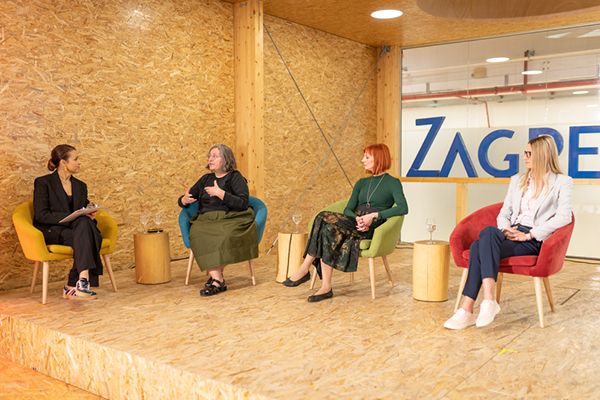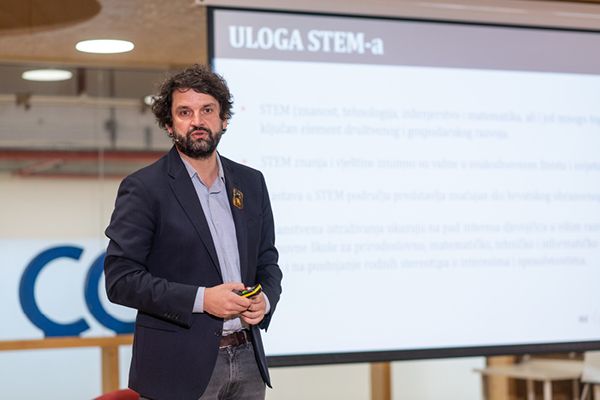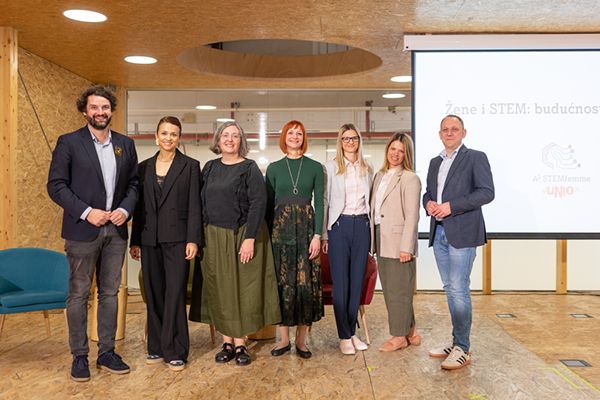Notifications list
STEMFemme project conducted in collaboration with A1 Croatia and the City of Split was presented to the public
Published: 12.04.2024.

The STEMFemme project, conducted in collaboration with A1 Croatia and the City of Split, was presented to the public on Wednesday, 10th April 2024. in Zagreb. Project leaders Boris Jokić, PhD and Zrinka Ristić Dedić, PhD presented results of the research conducted between 2021 and 2024 that included 10,642 girls and boys, pupils of 4th to 8th grades of elementary schools.
The aim of the research was to ascertain the reasons for persistence and withdrawing from educational and career aspirations in STEM among girls of elementary school age.
After an introduction to the project and its key findings by Boris Jokić, PhD, the programme continued with a panel-discussion “Women and STEM – The future is theirs“ in which the panelists were Zrinka Ristić Dedić, PhD, project co-leader, Katja Magdić Košiček, PhD, research associate at the “Ruđer Bošković“ Institute, Andrea Pirša Ilić, Head of the Centre for Excellence for AI and Data at A1 Croatia and rukovoditeljica Centra izvrsnosti za umjetnu inteligenciju i podatke u A1 Hrvatska i moderatorica Dubravka Štefanac Vinovrški, Director of Coorporative Communications at A1 Croatia.
The authors highlighted the following conclusions:
- Career aspirations at the end of elementary school in the Republic of Croatia indicate an extremely positive aspirational profile and a clear and strong orientation towards STEM – the three most desirable areas of work are Biomedicine and Health (14.0% of pupils), Computer Science (6.4%), Electrical and Mechanical Engineering (5.7%).
- 25.3% of participants do not report having a career aspiration at the end of elementary schooling, which points to the need of introducing a systematical informing and counselling on educational and professional opportunities in Croatian education.
- Aspirations towards all STEM working domains grow during elementary schooling. Compared to the 4th grade, the end of elementary school is marked by an extreme downfall of aspirations towards working in Education, Veterinary Sciences and working with Animals, and in Sports.
- There are clear gender differences in career aspirations towards certain STEM domains.
- Career in Biomedicine and Health is aimed by as many as 21.5% of girls and 5.9% boys in the 8th grade.
- There are no significant gender differences in career aspirations for Natural Sciences and Maths, whereby the ratio of girls wishing to achieve a career in this STEM domain increases during the course of elementary schooling.
- 11.4% of boys who are at the end of elementary schooling attach their career aspirations to the domains of Electrical Engineering, Mechanical Engineering and Naval Architecture. There is only 0.4% of girls having the same preference.
- In the Republic of Croatia there are prominent gender differences in career aspirations in the areas of Information and Computing Science. Career in this area is desired by 11.9% of boys and only 1.2% of girls in the 8th grade.
- During elementary school there are no differences between girls and boys in their personal conviction about them being competent in Maths. For both genders this conviction decreases during the course of elementary schooling.
- While in the 5th grade there are no gender differences in the conviction regarding the competence for Informatics and Techical Culture, it decreases significantly for girls during their schooling.
- Girls in the 5th and 6th grade from Gornja Stubica, Hvar, Split and Vrgorac indicate that the domain of Informatics and Computing is strongly marked by stereotypes, whereby jobs in this domain are still attributed to the male sex (“…they are somehow more handy with computers and know what to do with them.“). Also, girls emphasize personal stereotypes related to jobs in Informatics and Computing (“You twist your back of all the sitting.“), and a difference in terms of their personal wishes (“I'm not that much into programming for life, because I don't feel like staying at home and standing there and typing all the time…“).
- The research findings are embedded in the extracurricular activity STeam which is in collaboration with the City of Split implemented in 14 elementary schools in Split. A total of 175 girls and 12 boys under supervision of 52 female and 6 male teachers have tackled in an innovative way topics such as AI, smart city, robotization, sea, science in dancing…


